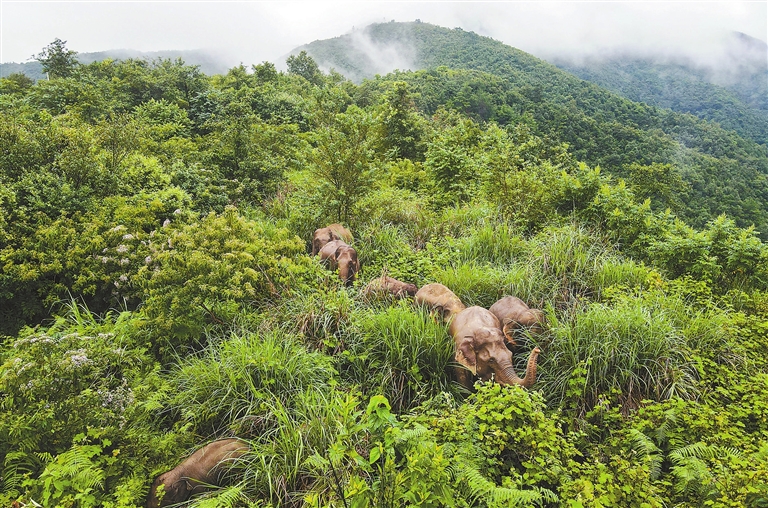
TANG ZHENGFANG, a farmer from Jinning District, Kunming, capital of Southwest China’s Yunnan Province, has been longing for some special friends — a herd of Asian elephants which he met by chance a year ago. In March 2020, a herd of 15 wild Asian elephants left a forest nature reserve in Xishuangbanna, Yunnan, and trekked about 500 km northward to Kunming in June 2021. During the time, Tang contacted the local government to donate about 5 tons of corn to feed the giant creatures. “Hearing that the elephants were wandering near our village, I was quite excited, but also worried that they wouldn’'t have enough to eat in the forest nearby,” the 50-year-old recalled. These Asian elephants returned to their original habitat in the Mengyang area of Xishuangbanna National Nature Reserve on Dec. 9, 2021, where they have remained to the present day. Now, the elephants occasionally forage at the edge of the forests and live in harmony with surrounding communities, according to the management bureau of the nature reserve. “I am pleased to know that they have enough food to eat and the local government has strengthened protection for them. I hope to have a chance to visit them,” said Tang. The management bureau of the reserve said that monitoring data showed that the baby elephants born during the northward journey are growing up and finding independence. In January, another baby elephant was born at the reserve. Since then, the herd of elephants have moved deep into the forests in Mengyang and are rarely seen. Chen Fei, director of the Asian elephant research center under the National Forestry and Grassland Administration, said that the efforts made by the Chinese government and local residents have served as a vivid example of China’s determination to promote harmony between man and nature, providing a warmhearted example for global wildlife conservation. “Helping the herd go home does not signal the end of our efforts. There is still a long way to go to protect Asian elephants and their habitats,” said Chen, adding that Asian elephants have been included in the list of 48 critically endangered species under emergency protection during China’s 14th Five-Year Plan period (2021-2025). As the environment continues to improve, the population of Asian elephants will inevitably continue to grow. Finding a resolution to the human-elephant conflict has never been easy, according to Chen. Although the Asian elephant population is declining worldwide, thanks to protection efforts over the past 30 years, their population in China, mostly in Yunnan, has grown from 180 to around 300, and is still growing. By protecting and restoring their habitats, preservers of Asian elephants continue to improve their living environment and better monitor their conditions to minimize human-elephant conflicts. Meanwhile, authorities are building a rainforest national park for Asian elephants to better coordinate trans-regional ecological protection efforts, study and protect the species and their habitats. “Starting with protecting the Asian elephant population and its habitat, we should protect the precious tropical rainforest ecosystem. It is of great significance to the establishment of a long-term mechanism to protect the natural resources and ecological system,” said Chen, adding that the goal is to achieve a harmonious relation between men and elephants. (Xinhua) | 
